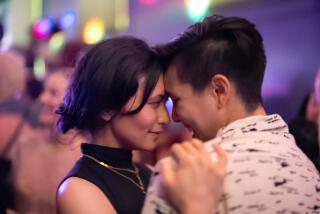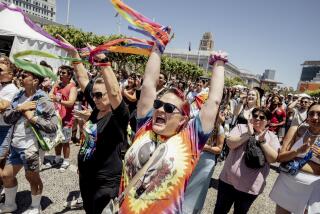Gay Pride Confronts an Identity Crisis
SAN FRANCISCO — SAN FRANCISCO -- Yep, they’re gay.
But are they really a source of pride for the gay community?
For years, this city has staged one of the nation’s largest gay pride celebrations, showcasing a community that is no fringe minority, but a cornerstone of San Francisco’s power structure.
That increasingly has meant participation by gay businessmen, corporations and political conservatives--a sign to some of the community’s ever-expanding assimilation into the mainstream.
But a growing number of old-school, left-leaning gay activists are convinced that their movement is being sold to the highest corporate bidder, and that it has become so inclusive that it may rip its once-radical roots out.
As San Francisco prepares for the annual Gay Pride Parade and Celebration on Saturday and Sunday--an event that is expected to draw a million people to downtown--many liberal gay activists have begun belittling some of their fellow entrants: gay power company executives who rake consumers over the coals, gay landlords who evict hard-working tenants, gay cops who still harass cross-dressers.
Corporate participation has risen dramatically, too -- Budweiser Light is a primary sponsor.
That evolution has been dramatic enough to provoke 500 activists recently to block off the Castro district--the center of the Bay Area’s gay community--to dole out “Gay Shame Awards” to people they see as hypocrites.
The “winners” included Mary Cheney, a lesbian who tirelessly campaigned for her father, now-Vice President Dick Cheney, after he compiled what critics called a vicious anti-gay record as a congressman. Mary Cheney also worked as the official liaison between Coors and the gay community, even as the company’s liquor profits were being funneled to conservative causes, such as a bitter campaign against same-sex marriage. (The White House has declined to comment.)
Another “award” was given to a gay-owned, Bay Area real estate development company that is alleged to have advised its clients on the best methods to evict tenants--thereby making possible higher profits when apartment buildings are sold.
*
Second Demonstration
The group behind the awards is planning a second demonstration during the parade. Among other activities, the group is planning to distribute small bags to parade watchers--”so they can vomit out their gay pride,” said Matt Bernstein Sycamore, a San Francisco resident who goes by the name “Mattilda” and is part of the “Gay Shame” effort.
What began as an amusing and lighthearted campaign to needle organizers of the parade has forced the gay community to address very real questions.
Organizers of the celebration have quietly begun in recent years to poll parade watchers to determine, essentially, whether they are there for a party or for their politics. Crowd members will continue to be polled: Questions will include whether they believe that the level of corporate sponsorship is appropriate.
The bottom line: Is a civil rights movement merely mature when it can tolerate internal dissent--as feminists may have demonstrated this spring when they disagreed over new data suggesting that women should give birth at a younger age? Or has the gay rights campaign lost touch with its roots, making it less a movement and more a niche for marketeers?
That, of course, depends on whom you ask.
“We can look at corporate sponsorship as being an accomplishment. We’ve achieved an acceptance that, 30 years ago, I thought I would never see,” said Tommi Avicolli Mecca, who was an early member of the Gay Liberation Front while a student in South Philadelphia and now is an activist for gay rights and tenants’ rights in San Francisco.
“But we want these corporations to be accountable for what they do on all fronts. These people are marching under the banner of ... what? The fact that we are all queer. And as a progressive, there is more to my vision of myself and the world, other than just my sexuality.”
Of particular concern to some observers this year is that the official motto of the parade and celebration--”Be Yourself”-- is the same as the slogan of one of its primary corporate sponsors, Budweiser Light.
Celebration organizers said that is a coincidence.
Critics aren’t convinced.
“They’ve kind of jumped off the deep end in terms of corporate sponsorship,” Mattilda said. “ ‘Pride’ has become little more than an opportunity for multinational corporations to target market. It’s a gated procession of one corporate banner after another.”
Teddy Witherington, executive director of the San Francisco Lesbian, Gay, Bisexual and Transgender Pride Celebration Committee Inc., the primary organizing committee behind the parade, said the Bay Area is full of gay activist organizations.
Those groups, he said, all lobby for their particular causes--politics, AIDS advocacy, health care and many more. That’s not what the parade and celebration are about, he said. What some view as a softening of the celebration’s edge is merely a reflection of how mainstream the gay community has become in the San Francisco area--and how diverse it is, he said.
“The community is not the same as it was 32 years ago,” Witherington said, referring to the city’s first pride parade.
“The community has evolved. The great thrill and wonder of pride is that everyone can be themselves. Sometimes people are themselves and it annoys other people--and that’s OK. What people kind of lose sight of is that our community is all communities. There are people in our community who have radically different views, but it’s big enough to [accommodate] that.”
*
Dissent Common
The gay community has long experienced a certain amount of internal dissent.
Indeed, the event that many consider the catalyst of the gay rights movement--the “Stonewall” riots in New York--began because of internal dissent.
In the summer of 1969, police raided the Stonewall Inn, a club in Greenwich Village with a largely gay clientele. Many wanted to respond in what was considered the common way at the time, with solemn marches and the lighting of candles.
But a more aggressive faction of gay people responded with demonstrations and riots, demanding job protection and an end to police abuse and anti-gay laws. That helped push the gay rights campaign onto the national stage.
Some San Francisco critics, however, believe that kind of internal dissent is different from allowing gay Catholics, for example, to march in a gay pride parade--even when the hierarchy of the Catholic Church believes homosexuality is a biblical sin.
The same holds true, they believe, for corporations with policies that are not considered progressive, or local officials who have not fought for the rights of all gay people.
“The political animal in me wants to see more than ‘We’re here, we’re queer, and we’re going to zip off as many clothes as we can and dance in the sun,’ ” Mecca said.
“That’s wonderful, but we’re dancing next to corporations who are running sweatshops in South Asia, politicians who voted against transgender medical benefits. These struggles are all connected.”
Calvin Gipson, the vice president of the parade and celebration’s board of directors, said he believes that the debate is a healthy reminder of an underlying dilemma that will always dog gay pride celebrations: “Is it a protest and a call to action? Or is it a celebration?
“A million people attend this event, and you probably have a million different opinions on that,” said Gipson, an organizer of a church-based program that feeds about 3,000 homeless people each day. “We encourage dissent. That’s a big part of why this event exists in the first place.”
*
Similar Concerns
If hard-liners in San Francisco have problems with the playful, welcoming nature of the gay pride celebration there, they would certainly fret over Los Angeles-area parades, said a West Hollywood city councilman, Steve Martin, a gay activist for the last 20 years in Southern California.
Periodically, similar concerns are raised in the Los Angeles area, he said.
For example, some have sought to introduce more liberal politics to the celebration, and others have urged parade organizers to better police its corporate sponsors--to ensure, for example, that sponsoring companies offer domestic partner benefits to gay couples.
But the reality is that Los Angeles is a less political, socially conscious place than San Francisco--sometimes to a disappointing extent, said Martin, who said he believes that parade watchers in Southern California could certainly stand a little more politics with their play.
“Are we just celebrating hot bodies and a good time? Or is there something more to it?” asked Martin, who received an award named after a gay icon, Harvey Milk, during last weekend’s gay pride celebration in Hollywood. “Los Angeles, unfortunately, has gone out of its way to keep it very sanitized. It just doesn’t fit L.A.’s style.”
More to Read
Sign up for Essential California
The most important California stories and recommendations in your inbox every morning.
You may occasionally receive promotional content from the Los Angeles Times.











